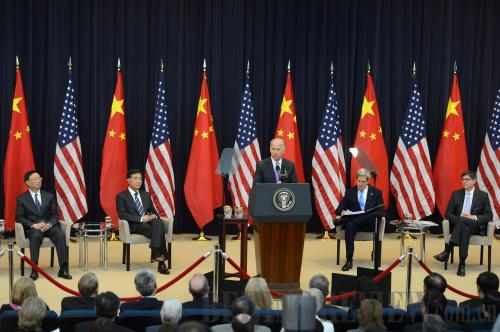|
 |
|
FRESH TALKS: U.S. Vice President Joe Biden (center) addresses the opening ceremony of the fifth round of the China-U.S. Strategic and Economic Dialogue on July 10 in Washington, D.C. He is flanked by Yang Jiechi (far left) and Wang Yang on the Chinese side and John Kerry (second right) and Jacob Lew on the U.S. side (WANG LEI) |
Where is the China-U.S. relationship heading? It's a big question not only for the two countries, but also in terms of the whole global situation as a whole. So far, it appears they are on course to make the wise decision to continue expanding cooperation.
The fifth round of the China-U.S. Strategic and Economic Dialogue (S&ED) was held on July 10-11 in Washington, D.C. Hundreds of leading officials from more than 20 ministries and departments of both countries discussed greater cooperation on a wide range of topics covering political, security, economic and financial issues during the two-day event.
Strategic understandings
This year's S&ED featured new faces since both countries organized new administrations. Acting as special representatives of Chinese President Xi Jinping, Chinese Vice Premier Wang Yang and State Councilor Yang Jiechi co-chaired the dialogue with U.S. President Barack Obama's special representatives Secretary of State John Kerry and Treasury Secretary Jacob Lew.
As U.S. and Chinese economies become increasingly interconnected, dialogue is better than confrontation and is important for both countries, Wang said on July 10. Good cooperation between China and the United States "can serve as an anchor for world peace and stability and an engine for prosperity and development," he said. "Our job is to turn the agreement between the two presidents into tangible outcomes and flesh out this new model of major country relationship so as to bring benefits to the people of the two countries and around the world."
"The dynamic that emerges between our nations will affect not just our peoples but, quite frankly, have a significant impact on the entire world," U.S. Vice President Joe Biden said. "Our relationship is and will continue to be a mix of competition and cooperation. And competition can be good for both of us and cooperation is essential."
"Generally speaking, this year's S&ED showed more continuity than changes. This is good because the most important aspect of the bilateral relationship is steady development," Yu Wanli, an expert on China-U.S. relations at the School of International Studies, Peking University, stressed to Beijing Review. He pointed out that this was the first S&ED after Xi's presidency and Obama's second term started, and both sides cherished this new opportunity of expanding cooperation in a new era. One month ago, the two presidents held an informal but important meeting in California, and reached common understandings. The S&ED implemented their agreements through practical cooperation to build up a new type of relationship between the two powers, said Yu.
Tao Wenzhao, a researcher on American studies with the Chinese Academy of Social Sciences, echoed Yu's view. He said the S&ED sought to plot a workable roadmap of developing their relations, adding that China and the United States have a strategic opportunity to enhance their relationship.
Cyber security, climate change and the Korean Peninsula issue were the three important focuses of the strategic dialogue this year. Yu believed these tough issues are both challenges and opportunities of China-U.S. relations.
Recently, former U.S. National Security Agency employee Edward Snowden revealed that the United States has maintained monitoring over countries including its allies and China. Previously, Washington had accused Chinese hackers of attacking U.S. networks.
"The Snowden event could be the catalyst for promoting bilateral cooperation in the cyber security area," said Yu. "The two countries are now occupying the same moral ground. Their cooperation will be more rational and placid." He stressed that there are no international rules or regulations governing cyber security, so if China and the United States successfully conduct cooperation in this field, they will become two of the most important rule-makers of the cyber world.
During the S&ED, China and the United States expanded their EcoPartnership program aimed at reducing greenhouse gas emissions, improving energy efficiency and creating jobs. Under the new agreements, another six pairs of Chinese and American institutes will join the original group of 18 partnerships.
| 